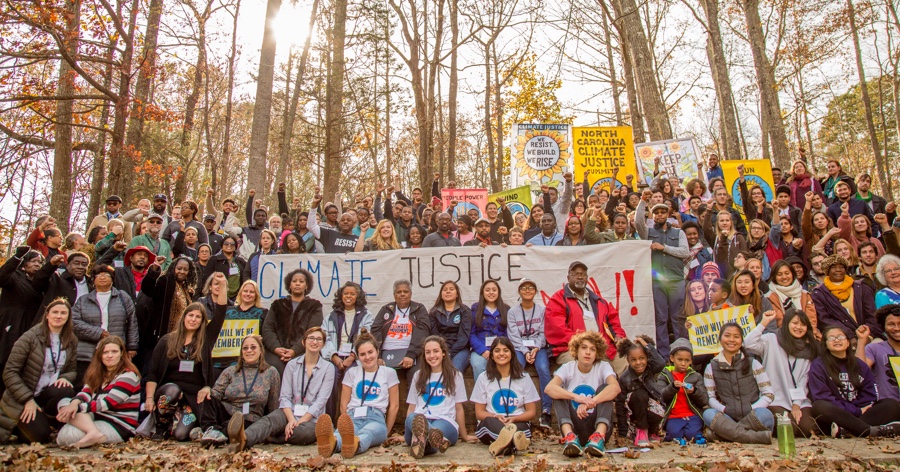A Perspective on the Green Economy from ACE Youth Rep Natasha
ACE Students
|July 9, 2012

This is a guest post by North Carolina Youth Rep Natasha.
Our planet’s natural resources are finite. This is the root of all environmental problems. It also happens to be the fundamental problem of economics. Then why do environmental activists and businesses always seem to be at odds?
This week I participated in a financial youth institute at the Kenan Flagler Business school and one of the topics I always made sure to question the professors about was economic sustainability. I wanted to know how businesses deal with environmental externalities. To my surprise they generally skated over the topics or mentioned them very briefly. I asked some follow-up questions and the general consensus is that business will consider environmental stewardship if it is feasible for them to do so. More often than not the idea is that profits generated can solve any environmental problems. To me, this seemed like a flawed idea.
Economics tries to identify a monetary cost or benefit to everything; even to things that aren’t quantifiable, such as love. If a business values the cost of environmental stewardship too high, the production might not ever get started. If a business values environmental stewardship too low, you end up with the BP oil spill. Analysts derive the cost of these unquantifiable things with data, math, and instinct. The numbers are never certain. With this semi-arbitrary cost, businesses make important decisions. Since there is no “right” answer, businesses have a built-in incentive to value the environment less in favor of productivity. After under valuing the cost of environmental consequences, let’s say production goes on and profits roll in. Now the business has to pay for the externalities. But since the business predicted costs to be much lower than they actually are, the business may not be able to fully pay for the consequences. Incentives are powerful things. Since business don’t have the incentive to be proactive in environmental stewardship, macroeconomics has to fill the gap that microeconomics has created.
Government can take the initiative and create incentives for businesses to consider the environment. Setting a carbon emission cap and giving tax benefits to businesses that don’t exceed that cap is just one way the government can create an incentive. Likewise there should be negative incentives. I am proposing a federal version of stickk.com. Companies would be required to set emission goals and put in a deposit as part of their contract. At the end of the contract if the goal is not met, the government keeps the deposit. Thirty-seven industrialized nations and the European community have already committed to lowering greenhouse gas emissions as per the Kyoto Protocol. The United States has refused to ratify the document since developing countries aren’t bound to the same emissions caps. Europe has championed the protocol in the past but the recent economic recession has them less than ambivalent about it.
It’s understandable why environmental stewardship isn’t a high priority during this “Great Recession”. Governments are pressured to stimulate quick short-term economic recovery with little regard for long term growth. However, long term economic growth should always be kept in mind and sustainability should definitely be included in that longer term growth.
Businesses function because of profit motive. However, countries are not businesses and therefore they should not use wealth as the only factor of success. Traditionally, when people compare countries in terms of success, they use gross domestic product. GDP fails to include how countries are protecting their natural resources and how much they are polluting (say CO2 emissions). Instead of looking at the actual growth in GDP and CO2 emissions (when comparing countries) we should look at it as GDP versus CO2 (like a ratio). That could show how efficient a country is. I am proposing that countries seek to balance GDP growth with CO2 emissions (or some other measure of pollution). The goal isn’t to incur GDP contraction in favor of sustainability. The goal is to be efficient. Countries should strive for increased economic output with less pollution. Using this kind of ratio to determine success is one way the consideration of sustainability can be smoothly transitioned into our government policies.
A very real example of the dire threat of scarcity is fossil fuels. Our economy runs on fossil fuels which won’t last forever; nor is it climate friendly. Not to mention that our main oil source (the Middle East) is in a land of shaky political turmoil. Its in the best interest of our domestic economy to be independent of oil. And I don’t mean just foreign oil. Destroying our domestic environment in the quest for oil isn’t advisable either. In that sense, green energy is a god sent gift. Not only will green energy create blue collar and white collar jobs related to energy production it will also fuel the rest of the economy. The silver lining is that the R&D involved in developing green energy and the construction of green energy infrastructure will be expensive.
A solution to that is to allow the free market to create the incentive for oil companies to use their profits to develop green energy. Our government subsidizes oil by spending $10 billion to $52 billion annually. In a free market there would be no government subsidies. However, subsidies are in place because the business in question provides a valuable service and would not be able to stay in business unless extra money is allocated to them. The oil industry is lucrative enough that they don’t need this subsidy. The 10 – 52 billion dollars can go towards green energy R&D. In addition, the increase in fuel prices will drive consumption down. This is similar to Europe that has a high tax on fuel. With the decrease in fuel consumption, oil companies now have an incentive to produce something else; namely: alternative fuels. Oil companies already have huge profits, assets, and wealth that they can use to invest in alternative fuels. And while consumption goes down, the need for energy will still be there. People will resort to carpooling, trains, bicycles, and public bus services for their transportation needs. Imported food prices will go up, causing consumers to turn to local markets for their food supply which will be a boon for the local economies. Medical costs will go up. However, the decrease in fuel consumption will cause us Americans to change our lifestyles. I believe we will be healthier when eating locally and biking and walking to places. This decrease in subsidy can’t be sudden or drastic but will have to be phased in slowly. It will be painful but there is much to be gained long-term and little to be lost short-term from de-subsidizing oil.
Incentives are a powerful thing. Used the right way, I believe that a free market can be maintained, sustainable growth can develop, and environmental stewardship will endure. The first step is to realize that we truly are on a planet of finite resources. Next we must face the true costs of our American lifestyle. Government has to stop running America like a corporation and more like a country. The Federal government has to step in and protect the people’s right to a clean and healthy environment. The Federal government has a duty to ensure that future generations will be able to prosper in America. I don’t blame corporations or businesses. They are driven by profit motive. I do believe that its up to our government to step in create the correct incentives for environmental stewardship. It is, after all, in our best interest.
Join our Youth Action Network
More Blog Posts

Unnatural, Not Unprecedented
For two weeks, residents of Southern California endured a waking nightmare. Parents raced against time – hurrying down the driveway …
Read MoreCrafting a Vision for the Future: My Experience at LCOY USA 2024
Dry and sunny Tempe, Arizona where temperatures have been over 100 F for 113 consecutive days, delegates gathered to attend …
Read More
7 Ways to Weatherproof Your Home on the Cheap (+1 Not-So-Cheap)
As colder weather sets in, understanding how to weatherproof your home is key to maintaining warmth and reducing energy costs. …
Read More